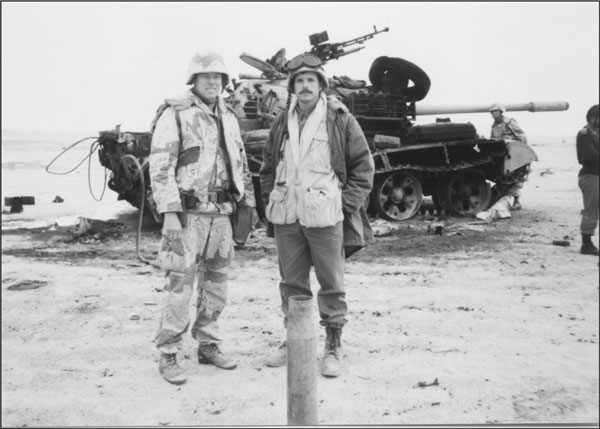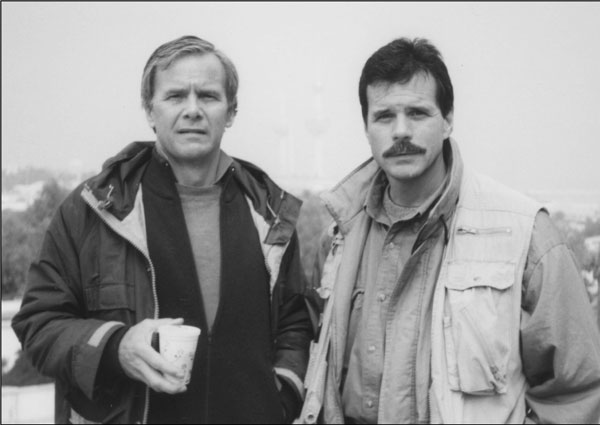Warrior Pose (16 page)
Authors: Brad Willis

We arrive at the new Marine camp at dark and are taken to the tent that houses this unit's division headquarters. General John Admire, who's in charge, is a calm and gentle man. I explain why I left the first unit and make my case for joining his. “We'll cover whatever you have going on with complete objectivity,” I tell him straight off, “but we'll always tell the whole story. I don't want a flack on my back all the time trying to manage the news.”
“We don't have a flack here,” Admire says in a tone that is strong yet soft. “You do your job, we'll do ours, and I'm sure we'll all get along fine.”
We're given cots in a small tent near headquarters and manage to make it to dinner before the mess hall closes. General Admire's unit is part of the First Marines. Nicknamed “The Old Breed,” it's the oldest and largest active duty division in the United States Marine Corps, with a ground combat force of more than 19,000 men and women. As promised, the general allows me full access, even letting us into the briefing room with a camera as he plans strategy with his men and updates them on the latest intelligence. Admire also agrees to an on-camera interview, discussing the artillery attack, which missed its mark and created no casualties. Then he offers a candid assessment of the coming war. He is insightful and straightforward, telling the world it won't be easy but that it will be done right and the Coalition Forces will prevail. It's the first time a general in the field has gone on-record like this, and it gives me the strongest reports I've filed since going into the field.
The following day, we drive to the port of Khafji to cover a unit of the National Guard providing security for coalition ships in the Gulf.
Most of these men are part-time Guardsmen who got called up for the war. They're not as indoctrinated as the regular troops, and they prove to be completely candid.
“This war has nothing to do with democracy,” one Guardsman says bluntly, stunning me with his candor.
“And America couldn't care less about liberating the Kuwaitis,” another agrees.
A third says, “We all know it's about oil. Just oil.”
A fourth chimes in, “Who wants to die for oil? Not me!” Everyone nods in agreement.
When this story hits the air, it causes a roar far greater than the report from the underground clubhouse. Even though Kuwait is a monarchy with a history of injustice and oppression, the White House and Pentagon have worked hard to cast Desert Storm as a fight for freedom and democracy, not oil. Top brass from the National Guard are flown in to make public statements about the commitment of their troops, the men who spoke their minds are reprimanded, and General Admire tells me he's been pressured to send me packing.
“I told them no,” Admire says. “We made an agreement. You tell the truth and we do our jobs. That's how democracies operate, and freedom of speech is one of the key things that sets us apart from dictators like Saddam.”
A few nights later, on January 29, 1991, the Iraqi Army invades Khafji, its first and only ground incursion into Saudi Arabia, and the First Marines spring into action. It's the biggest story yet, and we're the only media here.

For reasons of politics and appearances, the First Marines are ordered to hold a position just outside of Khafji while Saudi and Qatari forces take the front lines as Coalition Forces provide air support. On the second night, however, artillery shells begin to burst all around us. Everyone but me drags on the bulky MOPP suits and gas masks as we dive into bunkers. We've been warned repeatedly that Saddam might use chemical and biological weapons, and all of us are terrified
by the prospect. But I have no faith in the protective gear and it's a pain to get it on with a bad back. My cameraman understandably chooses to stay in the bunker as I grab his camera, crawl out, and film the greatest fireworks show I've ever seen. It's an instinctual act. I'm not courageous or suffering from illusions of invincibility. I just can't help myself.
The battle to take back Khafji rages for days. We push up to the outskirts with the Marines and film from a distance as the Saudi and Qatari ground forces fight to take back the city. Each night we return to our tent. The next morning we rush back to the front lines. Roadblocks are set up at strategic points to keep Saudis from driving to Khafji. We only get past them because I'm the pool reporter.
One morning at dawn we're stopped at a roadblock by Marines I don't recognize. A British print journalist is there claiming he is the pool reporter. It's not the first time my colleagues or I have departed from the truth to get to the action, but with two of us there, the Marines aren't letting either of us pass.
I pull my colleague aside and say, “Look, I'm the pool reporter. Everyone gets the story once we send it back to Dhahran. You have to take off.”
“Piss off,” is his answer. He wants the story exclusively for himself, everyone else be damned. If he can't go, he's wants to block access for the pool so that no one will get the news. It's all I can do to not grab him by the collar and force him to leave.
“Time for you both to turn around and depart,” a Marine at the barricade says with stern authority.
“Radio General Admire,” I ask with urgency. “Ask him who the pool reporter is. This guy is a liar.” The Marine pauses, tired of all this. But he finally agrees with my plea. Within minutes he has an answer. The British journalist is sent packing with his tail between his legs. Months later I will learn that he went home and wrote false stories trying to damage my reputation.
After days of conflict, the Iraqis retreat. We enter Khafji with the Marines as they secure the area, which is now a ghost town filled with death. There are bodies of Iraqi soldiers and Saudi civilians littering the streets. Iraqi tanks destroyed by Coalition air strikes sit
in the hot sand, their gray metal frames burned black. Scorched soldiers, charred like burned marshmallows, poke out of the tanks with contorted faces and flailing arms, frozen in time as they desperately tried to escape when the rockets hit their tanks. It's so macabre that my emotions go numb as I take close-up still photos.
We file our reports every day until the battle for Khafji is over. To bypass the sluggish military courier system, I drive our Jeep for several hours every night to Dhahran and deliver our tapes, then turn around and speed back, often arriving just before daybreak, collapsing for an hour or two on my cot before heading back into the field. It's exhausting, but the adrenaline rush keeps me going and helps hold my physical pain at bay. When it's finally over, the horror of Khafji remains fresh in my mind, but I feel a tremendous thrill of accomplishment and have an even deeper understanding of how addictive war can be.

With General John Admire, Khafji, Saudi Arabia, February 1991.

A few weeks later, the Coalition ground war is launched and I have more good fortune. It isn't the Army leading the charge toward Kuwait City as everyone expected; it's the First Marines.
As we cross the desert, most of the roads have been blown up or strewn with land mines, and we're forced to move at a snail's pace. The retreating Iraqi forces have set the Kuwaiti oil fields on fire as part of their scorched-earth policy. More than 700 burning wells are spewing so much thick smoke into the atmosphere that the sky is black even at midday. Oil constantly rains down, covering our clothing, saturating our hair, and flooding our eyes, noses, ears, and lungs.
It takes two grueling days to make it less than a hundred miles across the desert. Portions of the highway have been destroyed, forcing us to navigate around these areas by driving through the firm sand, where the Iraqis have managed to set a few landmines. The First Marines are just ahead of us and we follow their tire tracks with precision to avoid setting off an explosion. On the second day, we catch up with the Marines a few miles outside Kuwait City. Columns of escaping Iraqi vehicles have been hit so heavily by Coalition air strikes that the road has been nicknamed the “Highway of Death.”
To reach the city, we have to drive through, around, and over heaps of twisted steel. There are bodies littered everywhere. Some are still clinging to life. Others are in pieces and strewn among the wreckage. A few hundred yards from the city, we stop to film. As I walk through the carnage, I have to keep from slipping in pools of blood. When I stop to steady myself, I see a caterpillar on my pant cuff. It's quivering. I lean down, pick it off, and examine it. My breath stops as I realize it's not a caterpillar. It's the upper lip of an Iraqi soldier, covered by a thick mustache. And it's still warm.
More than feeling startled or repulsed, I'm deeply saddened. Throughout the ages we've attacked and destroyed one another in endless unspeakable ways, and as I drop the piece of human flesh, I wonder if we'll ever evolve to a point where we're mature enough to find a better way to resolve our differences. It's a brief reflection, then I hop back into our Jeep and we push on into the city.

A towering five-star hotel sits across from the U.S. Embassy in the heart of downtown Kuwait City. The fleeing Iraqis have sacked every room and it's now deserted. It's the perfect place to set up our broadcast headquarters. I find a suite on the third floor with a wide balcony overlooking the embassy. It's completely trashed, but the view is perfect and we quickly get set up. Soon, Tom Brokaw arrives from Saudi Arabia to anchor the retaking of Kuwait for
Nightly News
, debriefing me live as the Marines rappel from helicopters into the U.S. Embassy compound and raise the American flag.
There are small groups in the streets cheering the Americans as liberators, but most Kuwaitis have fled or remain in hiding. The city has been pillaged, and many have been murdered. After covering the securing of the embassy, I find my way to the main hospital, seeking to interview wounded citizens. Surprisingly, there are only a few Iraqi soldiers in the trauma ward, all with minor wounds. Their
glances are furtive. I suspect they fled to the hospital rather than get caught in the Coalition air attack.
